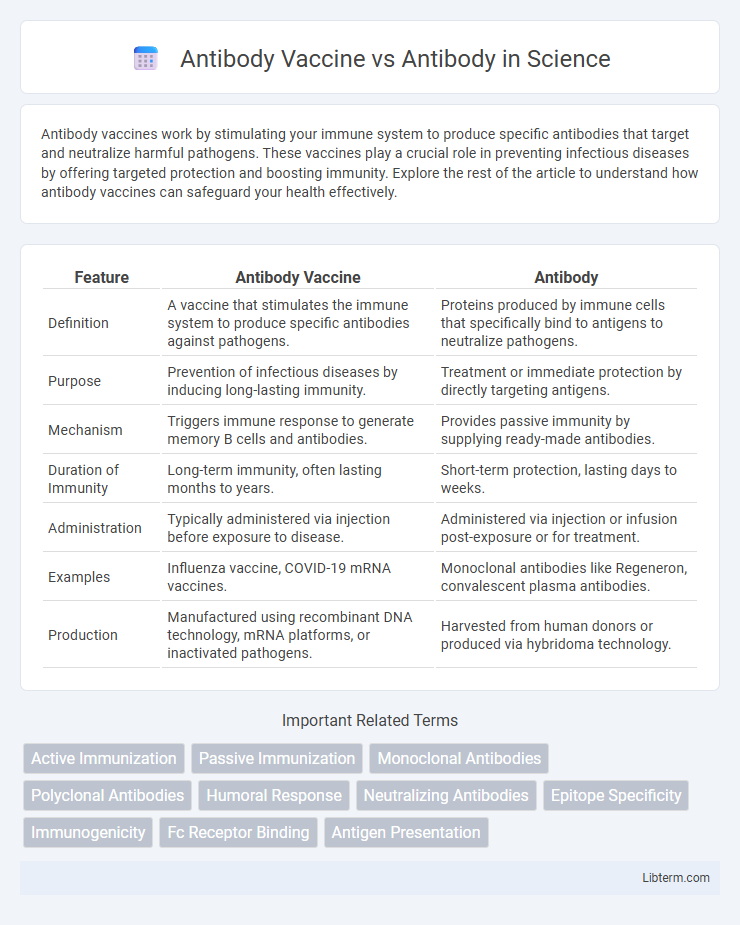Antibody vaccines work by stimulating your immune system to produce specific antibodies that target and neutralize harmful pathogens. These vaccines play a crucial role in preventing infectious diseases by offering targeted protection and boosting immunity. Explore the rest of the article to understand how antibody vaccines can safeguard your health effectively.
Table of Comparison
| Feature | Antibody Vaccine | Antibody |
|---|---|---|
| Definition | A vaccine that stimulates the immune system to produce specific antibodies against pathogens. | Proteins produced by immune cells that specifically bind to antigens to neutralize pathogens. |
| Purpose | Prevention of infectious diseases by inducing long-lasting immunity. | Treatment or immediate protection by directly targeting antigens. |
| Mechanism | Triggers immune response to generate memory B cells and antibodies. | Provides passive immunity by supplying ready-made antibodies. |
| Duration of Immunity | Long-term immunity, often lasting months to years. | Short-term protection, lasting days to weeks. |
| Administration | Typically administered via injection before exposure to disease. | Administered via injection or infusion post-exposure or for treatment. |
| Examples | Influenza vaccine, COVID-19 mRNA vaccines. | Monoclonal antibodies like Regeneron, convalescent plasma antibodies. |
| Production | Manufactured using recombinant DNA technology, mRNA platforms, or inactivated pathogens. | Harvested from human donors or produced via hybridoma technology. |
Understanding Antibodies: Natural vs Synthetic
Natural antibodies are proteins produced by the immune system in response to pathogens, providing targeted immunity by recognizing specific antigens. Synthetic antibodies, engineered in laboratories, mimic natural antibody functions and are designed for therapeutic uses, including antibody vaccines that stimulate the immune system without the presence of a live pathogen. Understanding the difference between natural and synthetic antibodies is crucial for developing effective antibody vaccines and advancing immunotherapy strategies.
What is an Antibody Vaccine?
An antibody vaccine is a type of immunization designed to stimulate the immune system to produce specific antibodies that target a particular pathogen, enhancing the body's ability to fight infections. Unlike direct antibody therapies, which provide immediate passive immunity through externally supplied antibodies, antibody vaccines promote active, long-lasting immunity by triggering endogenous antibody production. This approach leverages the body's adaptive immune response to recognize and neutralize viruses or bacteria upon future exposure.
How Antibody Vaccines Work
Antibody vaccines stimulate the immune system to produce specific antibodies by exposing it to a harmless form of a pathogen or its components, enabling the body to recognize and neutralize the actual pathogen upon future exposure. Unlike directly administering antibodies through passive vaccination, antibody vaccines trigger active immunity, resulting in sustained antibody production and immune memory. This approach enhances long-term protection by leveraging the body's adaptive immune response to generate targeted antibodies against viruses, bacteria, or toxins.
Natural Antibodies: Body's First Line of Defense
Natural antibodies, primarily Immunoglobulin M (IgM), serve as the body's first line of defense by recognizing and neutralizing pathogens without prior exposure. In contrast, antibody vaccines stimulate the immune system to produce specific antibodies against targeted antigens, enhancing long-term immunity. Understanding the role of natural antibodies helps optimize vaccine design to mimic and boost these innate protective responses.
Key Differences: Antibody vs Antibody Vaccine
Antibodies are proteins produced naturally by the immune system to identify and neutralize pathogens such as viruses and bacteria, providing passive immunity. Antibody vaccines, on the other hand, stimulate the body's immune system to produce specific antibodies actively, creating long-lasting adaptive immunity against targeted diseases. Unlike direct antibody administration, antibody vaccines enable memory immune responses, leading to sustained protection and reduced infection risk.
Clinical Effectiveness: Comparing Outcomes
Antibody vaccines stimulate the immune system to produce specific antibodies, offering long-term protection against infections, whereas passive antibody therapy involves direct administration of antibodies for immediate but temporary immunity. Clinical trials demonstrate that antibody vaccines provide sustained clinical effectiveness by reducing infection rates and severity over time. In contrast, passive antibody treatments show quicker symptom relief but require repeated doses to maintain protection, highlighting differences in duration and clinical outcomes.
Duration of Protection: Antibody vs Vaccination
Vaccination typically induces longer-lasting protection by stimulating the immune system to produce a broad range of antibodies and memory cells, whereas passive antibody administration provides immediate but short-term immunity, usually lasting weeks to months. The durability of vaccine-induced immunity can extend from several months to years, depending on the vaccine type and pathogen, while antibodies administered externally degrade over time without ongoing production. Memory B cells generated by vaccination enable a rapid and sustained antibody response upon re-exposure, contrasting with the transient nature of protection from administered antibodies alone.
Safety Considerations and Side Effects
Antibody vaccines stimulate the immune system to produce specific antibodies, offering proactive protection with generally mild side effects such as injection site pain and low-grade fever. In contrast, administering monoclonal antibody therapies directly delivers targeted antibodies, which may carry risks including allergic reactions or infusion-related symptoms. Safety considerations prioritize monitoring for hypersensitivity in antibody treatments, while antibody vaccines undergo extensive trials to minimize adverse events and ensure long-term immune tolerance.
Current Medical Applications and Use Cases
Antibody vaccines stimulate the immune system to produce specific antibodies, providing long-term protection against infectious diseases such as COVID-19 and influenza. In contrast, monoclonal antibody therapies offer immediate, targeted treatment for conditions like cancer, autoimmune disorders, and viral infections by directly administering lab-engineered antibodies. Current medical applications emphasize antibody vaccines for preventive immunization campaigns, while antibody therapies are critical for acute disease management and personalized medicine.
Future Trends in Antibody and Antibody Vaccine Development
Future trends in antibody and antibody vaccine development emphasize enhancing specificity and durability through advanced bioengineering techniques like monoclonal antibody modifications and mRNA vaccine platforms. Innovations in bispecific antibodies and antibody-drug conjugates are driving personalized immunotherapies, improving efficacy against emerging pathogens and resistant strains. Integration of artificial intelligence accelerates design and optimization processes, potentially revolutionizing next-generation antibody therapeutics and vaccines.
Antibody Vaccine Infographic

 libterm.com
libterm.com